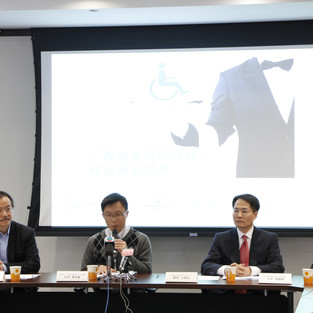(2014-2-6) Hong Kong Barrier Free Dining Mystery Shopper Research Announcement
- mansfield
- 2019年2月23日
- 讀畢需時 4 分鐘
Mystery Shopping Research Found that Most Chain Restaurants Failed to Meet Accessibility Requirements 75% Physically Disabled Have Discrimination Experience When Dining Out
[Press Release February 6, 2014] The HK Red Cross John F. Kennedy Centre Alumni Association announced the "Hong Kong Restaurant Mystery Shopping Accessibility Research" results today. Results showed that 87% of chain restaurants in the research sample failed to meet accessibility requirements*. Cantonese cafes scored lowest in terms of accessibility and indiscriminate service to the disabled. The key problems were the entrance threshold without ramp, lack of disabled toilets and unwelcoming staff. Fast food chains often have fixed seats unfriendly to wheelchair diners. Toilet doors of fast food restaurants were often difficult to open and self-serve process often caused difficulties for the disabled. Most Cantonese restaurants visited by mystery shoppers can meet basic accessibility requirements. However, staff attitude towards disabled customers seemed to be worse than those to non-disabled customers. Coffee shops have the best overall accessibility score. Yet, there was still room for coffee shops to improve in terms of their high-counter design and dark lighting. The research also found that 75% of physically disabled and 50% of visually impaired have experienced discrimination when they dine out.
Research agency Mansfield Consulting Limited has conducted the mystery shopping research in the fourth quarter of 2013. Wheelchair users, visually impaired, hearing impaired, elderly and able-bodied persons were invited to become mystery customers. 60 restaurants in random locations were selected from 17 well-known chain restaurants brands, including Cantonese restaurants, Cantonese cafes, fast food restaurants and coffee shops. Mystery Shoppers will disguise as normal customers and observe staff attitude and access facilities. A true barrier-free restaurant should allow people with disabilities to dine without the help of others.
HK Red Cross JFKCAA Chairman Dicky Tam said, "Even large chain restaurants are unable to address the needs of the disabled. You can imagine that small local restaurants should have even more barriers. Hong Kong is known as a ‘Gourmet Paradise’. However, for the disabled, the entrance gate to the ‘Paradise’ is closed."
Current Legislative Council Member Fernando Cheung remarked, “In 2041, one in every three people will be aged 65 or above; while about 80% of elderly will have disabilities of various degree. Businesses in many advanced countries already realized the opportunities of the elderly segment and offered barrier-free shopping experience to customers.” Cheung urged decision makers of Hong Kong restaurants to improve their barrier-free facilities and strengthen staff training on skills for serving the disabled. Also, the Hong Kong Government should also assist small local restaurants to improve their barrier-free facilities so that the disabled can dine out freely.
Management consultant Billy Man said, "Some restaurant owners believed that large investments are required to provide barrier-free facilities. However, some facilitiessuch as a mobile ramp only cost a few thousand dollars. Installation of service bells and signage cost only very little. The most important thing is for restaurant managers and staff to have empathy towards people with disabilities. If service staffs are unsure what customers need, they can always ask their guests directly. Customers would feel respected, avoid misunderstandings and turn them into loyal customers."
神秘顧客調查發現 大部份連鎖食肆不符合無障礙要求 75%肢體殘障人士出外用膳時曾經遇過歧視情況
【新聞稿2014年 2月6日】香港紅十字會甘迺迪中心校友會於今天公佈「香港無障礙食肆神秘顧客調查」報告結果。結果發現87%食肆均未能符合無障礙要求*。茶餐廳的無障礙設施及服務評分最低,主要問題是大門有門檻,令輪椅人士無法進入、缺乏殘疾人士洗手間及職員態度不友善令殘疾人士感到不受歡迎。快餐店的無障礙設施對輪椅人士影響較大,主要問題是固定座位令輪椅人士無法入座、洗手間的門難以打開、通道有雜物阻礙出入等;而自助購物形式則對視障人士構成不便。中式酒樓雖然在設施上普遍符合要求,但職員對殘疾人士的服務態度明顯遜於非殘疾人士。咖啡店的整體表現最好,只是服務櫃台過高,輪椅人士難以購物及提取食物;而部份店舖燈光過暗,不方便視障人士進出。調查亦發現,75%肢體殘障人士及50%視障人士出外用餐時曾經遇過歧視情況。
調查機構萬賢堂管理顧問有限公司於2013年第四季,派出輪椅、視障、聽障、長者及健全人士進行神秘顧客調查。被調查的為17個連鎖食肆品牌,當中食肆類別包括酒樓、茶餐廳、快餐店及咖啡店等合共60間分店。神秘顧客會打扮成一般食客,觀察店舖的無障礙設施及職員的服務態度,然後填寫評核報告。真正的無障礙食肆,可讓殘疾人士在無需他人協助及在沒有過份困難下於食肆內用膳,包括進入店舖、落單、取餐及用餐等步驟。
該會主席譚志豪表示:「假如有充分資源的大型連鎖食肆也未能照顧殘疾人士的需要,大家可以想像,一般小型食肆的情況只可能會更差。香港被譽為美食天堂,但對殘障人士來說,這個天堂門口暫時仍然設了一道大閘,我們未能輕易進入一起共享。」
立法會議員張超雄指出,人口老化問題日趨嚴重,根據人口政策諮詢文件推算,到2041年每三個市民當中就有一位為65歲或以上的長者,而當中約八成的長者會遇到臨時或永久性殘疾。張表示,很多先進國家早已洞悉商機,為老化人口及殘障人士提供無障礙的消費體驗,呼籲食肆商戶改善無障礙設施,加強內部培訓,使員工認識服務殘疾人士的技巧及應有的態度,打做真正無障礙食肆。而政府亦要提供支援,協助小本經營的食肆改善無障礙設施,讓更多殘疾人士可以受惠。
調查顧問文樹成表示:「有些食肆東主以為要為殘疾人士提供服務便要投資大量金錢去改裝設施。其實,有些設備如活動輪椅斜板,只需數千元,而加裝服務鈴及提供清晰的指示牌更所費無幾。最重要是食肆員工及老闆對殘疾人士能有同理心,大部份問題均可解決。若不清楚如何為殘疾食客提供支援,不防直接詢問客人的需要,客人感覺受到重視,不但可避免互相猜測而引起的誤會,更可令他們重複消費,成為食肆的忠誠顧客。」










留言